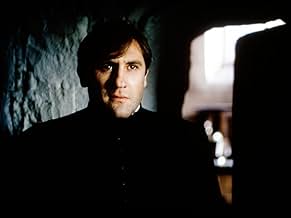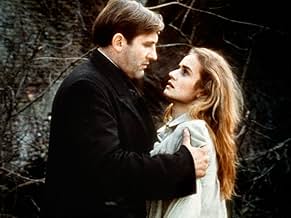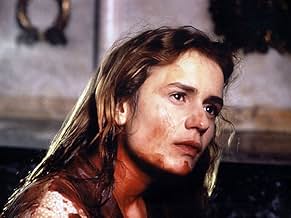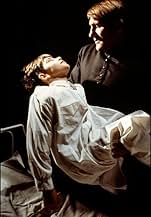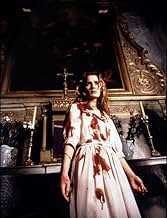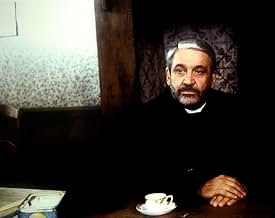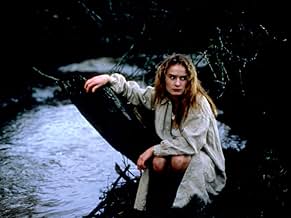Agrega una trama en tu idiomaA priest stuck in a rural congregation and burdened with his overwrought spirituality, finds purpose in a troubled woman accused of murder.A priest stuck in a rural congregation and burdened with his overwrought spirituality, finds purpose in a troubled woman accused of murder.A priest stuck in a rural congregation and burdened with his overwrought spirituality, finds purpose in a troubled woman accused of murder.
- Dirección
- Guionistas
- Elenco
- Premios
- 2 premios ganados y 7 nominaciones en total
- Havret
- (as Pierre d'Hoffelize)
- Mr. et Mme de Wamin
- (as Bernard et Yolande de Gouy)
- Mr. et Mme de Wamin
- (as Bernard et Yolande de Gouy)
- Dirección
- Guionistas
- Todo el elenco y el equipo
- Producción, taquilla y más en IMDbPro
Opiniones destacadas
We see nothing of the parochial trials, and sickness, endured by Bernanos' Curé de campagne (Robert Bresson's film), faced with hostility and mockery from his villagers. The two traumatic events (Mouchette cutting her throat, and a dying boy "coming to life" in the priest's arms) shock us, but do not form an integral part of the curate's spiritual day-to-day experience. They are merely sensational. Depardieu is not convincing as an agonised believer. Yet, in the spontaneous sincerity of his accompanying interview, he appears to draw inspiration from Augustine!
Having not read the original novel, I couldn't say how much is from the original and how much is from the film itself. But despite being from the 1920s, the story has a very modern feel to it. It could be the 1920s, the 1980s or even the 2010s.
There is that constant play between faith, conviction and organization. And it need not be the Catholic Church. Any organization, religious or secular, will have its passionate members who want to do something more. This is a very nice examination of that, and really showcases what made Depardieu an international star.
From this basic premise the film can be explored from several key standpoints to obtain real insights into subjects such as the power/source of faith, the relationship between thought/belief and one's relationship to the world we inhabit.
Moreover, the questioning employed by Pialat and Depardieu means that the path of thought through these issues is profound, intense and disturbing. The film provokes the intellect constantly and I could understand that if there was nothing more to the film, one might say that "is that it?"
What takes this film much further is the emotional undercurrent - both understated and abyssal, the stunning cinematography and restrained direction. These factors combine to create a complete cinematic experience.
One scene stands out in this respect: we watch the priest wander the countryside in a daze and he pauses on the side of a hill, lush with spring grass. Depardieu looks up, eyes searching for insight, an answer, a response. In a brilliant stroke of luck, passing clouds obscure the sun and Depardieu instinctively internalises this shifting light with a simultaneous passing of emotion portrayed through his face and posture. We watch both the internal shifting cloud of emotion and the changing light create a charge and intensity that is rarely seen in cinema. There is an element of the `unknowable' in this scene that still moves me, even after many viewings.
I also enjoy making comparison between this film and Dreyer's "Das Wort" (The Word), my favourite of Dreyer's works which has some common theme's, explored from different perspectives.
A truly great film, worthy of the Palme D'or it won.
As a French and a movie lover, I admire many french authors and film makers that are deemed 'difficult' or intellectual (I adore Godard for one). This movie is not a masterpiece of cinema: it lacks all the characteristics of it.
The actors are the major problem of the film. Depardieu has no spirituality and it shows. Sure he's a "nice guy" in life and he can be very good in lighter roles, but how anyone can find him convincing in this role I can't imagine. Sandrine Bonnaire, apart from the fact that it takes tremendous imagination to believe that she is supposed to be attractive, is not movie actress. Her performance is that of a boring theater player (I caught her several times looking at the audience, waiting for applause).
As for the story, it jumps from scene to scene without any sense of continuity or progress, it's mere accumulation that goes nowhere.
But then of course it won a Palme d'Or, well that must mean it's good and we're not able to grasp such high and elevated thinking!
Sorry I don't buy.
¿Sabías que…?
- TriviaWhen the movie was announced as the winner of the Palme d'Or at the Cannes Film Festival, with the jury declaring that it was an unanimous vote, the audience, who expected Las alas del deseo (1987) to win, booed when the director Maurice Pialat was on his way to the stage to receive the award. Pialat's response to this was to raise his fist, replying: "If you don't like me, I don't like you either".
- Citas
[first lines]
Donissan: With you, everything looks easy. Alone, I'm useless. I'm like the zero, only useful next to other numbers. Priests are so miserable. They waste their lives seeing God being ignored. People make jokes on us. We're like those walls where people write obscenities.
Menou-Segrais: You're tired.
Donissan: Tired? I'm not tired. Tired is a bad thought.
Menou-Segrais: Suspend your visits.
Donissan: Those visits do more harm than good. In the beginning, I didn't know evil. I learned it from the mouths of the sinners.
Menou-Segrais: No one knows better than a priest about the terrible monotony of sin.
Donissan: I can't speak to them. I can't only make absolutions and feel sorry.
Menou-Segrais: If one absolution in thirty was worthy, the world would be brief.
- ConexionesFeatured in Les cent et une nuits de Simon Cinéma (1995)
Selecciones populares
- How long is Under the Sun of Satan?Con tecnología de Alexa
Detalles
- Fecha de lanzamiento
- País de origen
- Sitios oficiales
- Idioma
- También se conoce como
- Under the Sun of Satan
- Locaciones de filmación
- Productoras
- Ver más créditos de la compañía en IMDbPro
Taquilla
- Total en EE. UU. y Canadá
- USD 68,765
- Fin de semana de estreno en EE. UU. y Canadá
- USD 6,987
- 22 ene 1989
- Total a nivel mundial
- USD 69,688
Contribuir a esta página


![Ver Trailer [English SUB]](https://m.media-amazon.com/images/M/MV5BZDhmMWVjNGItMWM0NC00NmUzLTk5NmQtNDM4NjBjM2JjNjJmXkEyXkFqcGdeQXRyYW5zY29kZS13b3JrZmxvdw@@._V1_QL75_UX500_CR0)
